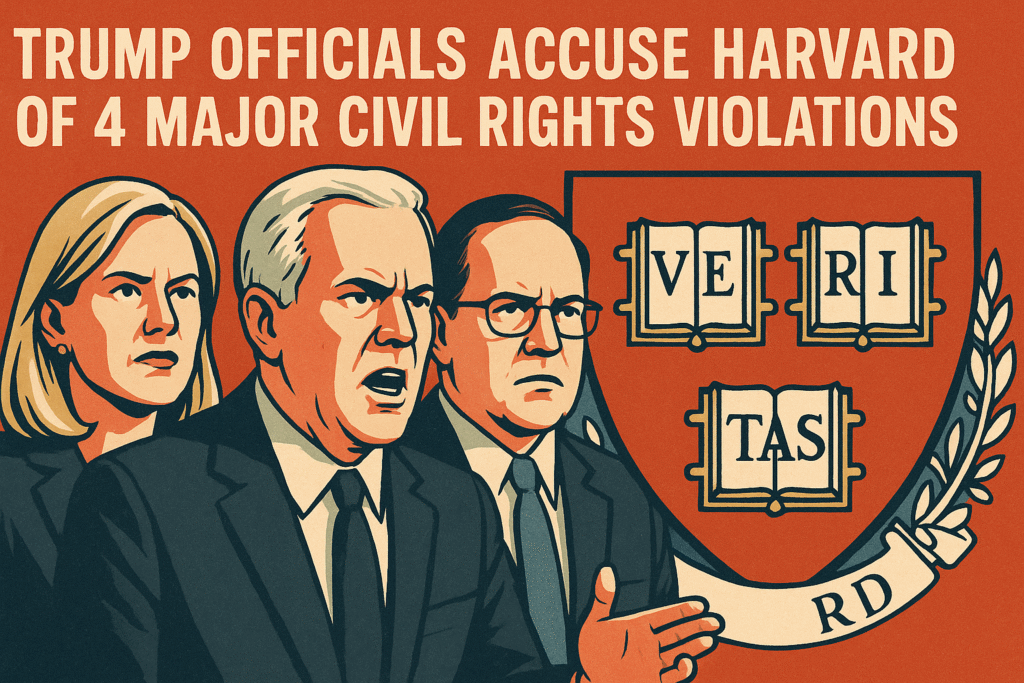Trump Officials Accuse Harvard of Civil Rights Violations Over Antisemitism Concerns
In a significant escalation of tension between the federal government and elite academia, Trump officials accuse Harvard University of violating federal civil rights laws by allegedly failing to protect Jewish and Israeli students from harassment and threats during campus protests related to the Gaza conflict. The accusation, formalized in a letter sent to Harvard President Alan M. Garber, marks the culmination of months of scrutiny and public criticism by the Trump administration.
According to two individuals familiar with the situation, the administration’s determination concluded that Harvard ignored multiple complaints from students who felt targeted and unsafe during escalating anti-Israel demonstrations throughout the 2023-24 academic year. These findings follow a recent internal report by a Harvard task force acknowledging that many Jewish and Israeli students felt alienated and under threat on campus.
Background and Findings
The Trump officials accuse Harvard letter, sent on July 1, 2025, outlines how the university allegedly failed to act in response to a hostile campus climate. It reportedly highlights several documented incidents where students’ concerns were dismissed or inadequately addressed by university authorities. These events occurred amid pro-Palestinian protests that intensified after the escalation of the Israel-Gaza conflict in late 2023.
Sources say the administration’s investigation began earlier this year and was prompted by complaints from students, faculty, and alumni. The Office for Civil Rights under the Department of Education led the probe, which now places Harvard in direct violation of Title VI of the Civil Rights Act, which prohibits discrimination based on race, color, or national origin in federally funded programs.
Harvard’s Silence and Ongoing Negotiations
So far, Harvard has refrained from publicly commenting on the contents of the letter. However, sources confirm that university leadership has been in quiet negotiations with federal officials to reach a settlement. The stakes are high: the Trump administration has already cut billions of dollars in research grants to Harvard as part of its broader campaign against what it calls “ideological extremism and antisemitism in higher education.”
President Trump took to social media to comment on the unfolding issue, stating that any settlement would be “mindbogglingly HISTORIC” and potentially transformative for the nation. He praised Harvard’s leaders for their conduct during the talks and suggested that the university appeared willing to make significant reforms.
Historical Context and Political Undercurrents
This is not the first time Trump officials accuse Harvard of misconduct. In recent weeks, the administration broadened its investigations to include alleged discrimination against white male applicants and policies perceived as favoring international students. These efforts are part of a wider initiative aimed at reshaping the culture of American higher education institutions.
The administration has leveraged federal funding as a key tool in its efforts. Terminations of contracts and grants have already been executed at Columbia University, which was found in May to have committed similar civil rights violations. Experts suggest that the punitive financial measures are designed to pressure universities into adopting more conservative governance and admissions policies.
Response from Academia and Public Debate
University leaders and academic freedom advocates have raised alarms over what they describe as government overreach. Dr. Garber, among others, has acknowledged that Harvard could have done more to address the fears of Jewish students. Still, they argue that the administration’s sweeping demands—which reportedly include control over hiring, admissions, and curricula—pose a threat to academic independence.
Students and faculty remain divided. Some support the administration’s actions, citing concerns about growing antisemitism on campuses. Others argue that the crackdown is politically motivated and undermines efforts to maintain open dialogue and freedom of expression within educational spaces.
The Trump officials accuse Harvard campaign has sparked debates on multiple fronts: civil liberties, freedom of speech, identity politics, and the politicization of education. In the words of a senior faculty member, “This isn’t just about antisemitism. It’s about redefining what a university is supposed to be.”
Implications for Harvard and Other Institutions
Legal experts believe that the next steps could include a court-enforced settlement or a consent decree that imposes stringent conditions on Harvard’s policies and operations. Such a development would be unprecedented in scope and could serve as a model for how other universities are treated in similar investigations.
Meanwhile, the administration’s scrutiny continues. Officials have warned other universities that they could face similar action unless they demonstrate proactive efforts to combat antisemitism and ideological bias.
The Department of Justice and the Department of Education have both emphasized that their goal is to uphold civil rights protections, not to micromanage institutions. Still, critics argue that the administration’s approach undermines the autonomy of educational institutions.
Conclusion for Trump Officials Accuse Harvard
As Trump officials accuse Harvard of violating federal civil rights laws, the Ivy League institution finds itself at a crossroads. Whether through settlement or litigation, the outcome will likely reshape its policies, culture, and public image.
More broadly, the episode signals a shift in the federal government’s approach to higher education, with civil rights enforcement becoming a new front in the political battleground. In the meantime, students, faculty, and policymakers alike are watching closely, as Harvard becomes a test case in the ongoing debate over academic freedom, civil rights, and government accountability.
For now, one thing is clear: the accusations by the Trump administration mark a pivotal moment not just for Harvard, but for the future of American academia.
